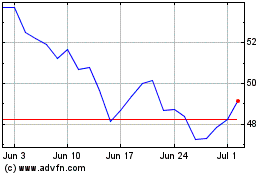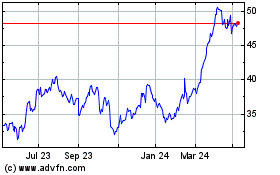Tighter French Emissions Probe Is Urged
August 23 2016 - 3:57PM
Dow Jones News
By Nick Kostov
PARIS -- A member of a French commission set up to test cars
after the Volkswagen AG scandal is pressing the French government
for a deeper inquiry to establish whether car makers are illegally
using software to mask their emissions during tests.
Pierre Perbos, president of Réseau Action Climat France, an
association specializing in climate change, last week sent a letter
to French Environment Minister Ségolène Royal urging her to expand
the investigation.
The commission didn't examine the precise conditions that
trigger software to shut down antipollution systems. It is legal
for cars to turn off antipollution devices for safety or to protect
the engine, but not to deliberately trick emissions tests.
"We're asking Ms. Royal to have the experts examine the software
to determine if there is a fraud," Mr. Perbos said.
In the report, published July 29, the commission said it hadn't
proven the presence of illegal so-called defeat devices but
couldn't rule them out. It concluded that many of the cars it
tested from manufacturers including Renault SA and Ford Motor Co.
exceeded European Union limits for both nitrous-oxide and
carbon-dioxide emissions many times over when tested under real
driving conditions.
"We clearly identified the systematic use of devices to turn off
antipollution systems, but we haven't got the means to investigate
further," Mr. Perbos said.
Only Volkswagen has so far admitted to fitting some cars with
devices to cheat emissions tests, while both Renault and Ford have
denied using them.
Europe's auto makers have plowed billions of euros into
developing so-called clean diesel technology -- fuel-sipping cars
fitted with updated emissions systems to reduce the amount of
particulate matter and nitrous oxide discharged in the air.
But many of these cars include the devices to turn off the
antipollution systems. The report says it "remains to be proven"
whether manufacturers are right to say that the devices are
necessary for safety and reliability reasons. Turning off
antipollution systems can happen automatically in response to
engine temperature, outside air temperature or the speed at which
the engine is turning.
The results of the report have reignited a debate on the
difference between laboratory testing and road testing.
"It's very easy for car manufacturers to cheat laboratory tests
because their conditions are known and very precise," Mr. Perbos
said.
Last September, Volkswagen admitted that some its cars had
engines programmed to recognize when they were being tested,
leading to billions of dollars in fines and sparking a backlash
against diesel-powered vehicles in Europe.
The following month, Ms. Royal formed a commission to test 86
cars across the country's auto industry to determine whether the
problem was more widespread. Auto makers appeared before the
special commission to explain why their cars failed the recent road
tests and how they would improve their performance.
"If we want to go further, the logical next step is to look at
the software used by the all of the manufacturers, to make sure
that there's no fraud," said Éric Horlait, an executive at research
body Inria and one of 17 members of the commission.
French car maker Renault has been among the worst offenders,
with the report saying that some of its models emitted nitrous
oxide many times over the EU legal limit.
In April, the French car maker announced measures to reduce its
emissions of nitrous oxide. Its so-called Nox trap had previously
activated only between 17 and 35 degrees Celsius, or between 63 and
95 degrees Fahrenheit. Cars are typically tested at temperatures
within that range, but temperatures in France are often lower. In
Paris, the average monthly temperature is 17 degrees Celsius or
below for seven months of the year.
"Renault was not the best student in the class, that's true, but
I didn't hear anything about Renault cheating," said Daniel Quéro,
president of a car-drivers' association and a member of the
commission. "If you change the nature of the test, it's normal that
the results will come out differently."
A spokesman for Renault reiterated that its cars don't have
emissions-cheating devices and that the company provided the French
commission all required technical explanations. Officials in Ms.
Royal's office declined to comment on the next steps for the
committee after the publication of its report.
--Inti Landauro contributed to this article.
Write to Nick Kostov at Nick.Kostov@wsj.com
(END) Dow Jones Newswires
August 23, 2016 15:42 ET (19:42 GMT)
Copyright (c) 2016 Dow Jones & Company, Inc.
Renault (EU:RNO)
Historical Stock Chart
From Mar 2024 to Apr 2024

Renault (EU:RNO)
Historical Stock Chart
From Apr 2023 to Apr 2024
